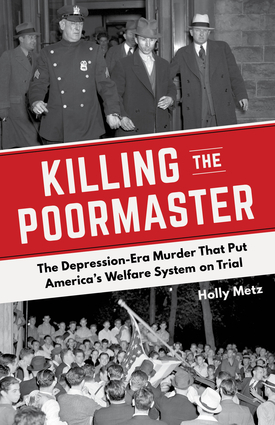Suggested reading from Chicago Review Press
 Mother's Day Mother's Day |
 Father's Day Father's Day |

 |
The Depression-Era Murder That Put America's Welfare System on Trial
By Holly Metz
HISTORY
320 Pages, 6 x 9
Formats: PDF, Mobipocket, EPUB, Trade Paper
Trade Paper, $19.99 (US $19.99) (CA $25.99)
ISBN 9781613736517
Rights: WOR
Chicago Review Press (Jan 2017)
Lawrence Hill Books
Overview
Reflecting on a sensational murder trial from the late 1930s, this chronicle focuses upon the death of Harry Barck, a poormaster who was granted the authority to decide who would and would not receive public aid in Hoboken, New Jersey. Unemployed mason Joe Scutellaro was said to have stabbed Barck in the heart with a paper spike after the poormaster suggested that Scutellaro’s wife prostitute herself on the streets rather than ask the city for aid. A legal team led by celebrated defender Samuel S. Leibowitz of “Scottsboro Boys” fame swooped into Hoboken from Manhattan to save Scutellaro from the electric chair, arguing that the jobless man’s struggle with the poormaster was a symbol of larger social ills. The book details Leibowitz’s transformation of the Scutellaro trial into an indictment of public relief as a tool for imposing social and political control nationwide. Grappling with issues that are still vital now—massive unemployment, endemic poverty, and the inadequacy of public assistance—this examination lends insight into the current social contract, relaying a gripping narrative that shockingly reads like today’s news.
Reviews
"A vivid and illuminating book. By focusing on particular events in the late 1930s Holly Metz manages to reveal the political dynamics of relief and the real tragedies our policy produces." —Frances Fox Piven, author, Regulating the Poor, and Distinguished Professor of Political Science and Sociology at the Graduate Center of the City University of New York"Holly Metz offers a grim and fascinating glimpse of Americans left to the mercy of petty bureaucrats and party pols once federal relief was withdrawn in the mid-1930s. Gripping history, Killing the Poormaster is also a warning to those who would continue to casually slash assistance programs today. A powerful and compelling book." —Stephen Pimpare, author, A People's History of Poverty in America
"Holly Metz not only opens wide a window on a fascinating epoch in American history, she sheds light on the bitter class enmity that continues to plague us today. Killing the Poormaster is a meticulous and mesmerizing look at our past, the story of one man who struck back at an unfair system and in so doing, ripped the cover off a city's legacy of corruption and injustice." —Anthony DePalma, author, City of Dust and The Man Who Invented Fidel
"Holly Metz vividly reconstructs the social milieu of Depression-era Hoboken, a cauldron of ethnic resentment, passionate loyalties, and profound human suffering, all on display in a murder trial Metz recounts with the flair of a dramatist and the gritty facticity of an investigative reporter." —James T. Fisher, author, On the Irish Waterfront: The Crusader, the Movie, and the Soul of the Port of New York
"Rigorously researched and vividly recounted, this history of the death of a Hoboken Poormaster in the 1930s brings back a time, not unlike today, when a corrupt welfare system made poverty a crime, pushing honest citizens to extremes in their efforts to survive. Move over reality TV, Metz tells a story that rivals your best." —Fred Gardaphe, Distinguished Professor, Queens College/CUNY, and author of From Wiseguys to Wise Men
"This is a well-researched, engrossingly written book which in winning fashion tells a tale that needed to be told, and although unfortunately long overlooked has found a splendid chronicler in Holly Metz." —Daniel J. Leab, Professor of History, Seton Hall University
Author Biography
Holly Metz is a writer and journalist on law, culture, and social issues. She is the coauthor of How to Commit Suicide in South Africa. She has contributed to Democracy in Print: The Best of the Progressive Magazine as well as Labor History, Metropolis, the New York Times, Poets & Writers Magazine, and the American Bar Association publication, Student Lawyer. For her work as a journalist and a public historian, she has been recognized by the American Association of State and Local History, the Dick Goldensohn Fund, the New Jersey Historical Commission, and Project Censored. She lives in Hoboken, New Jersey.
Awards